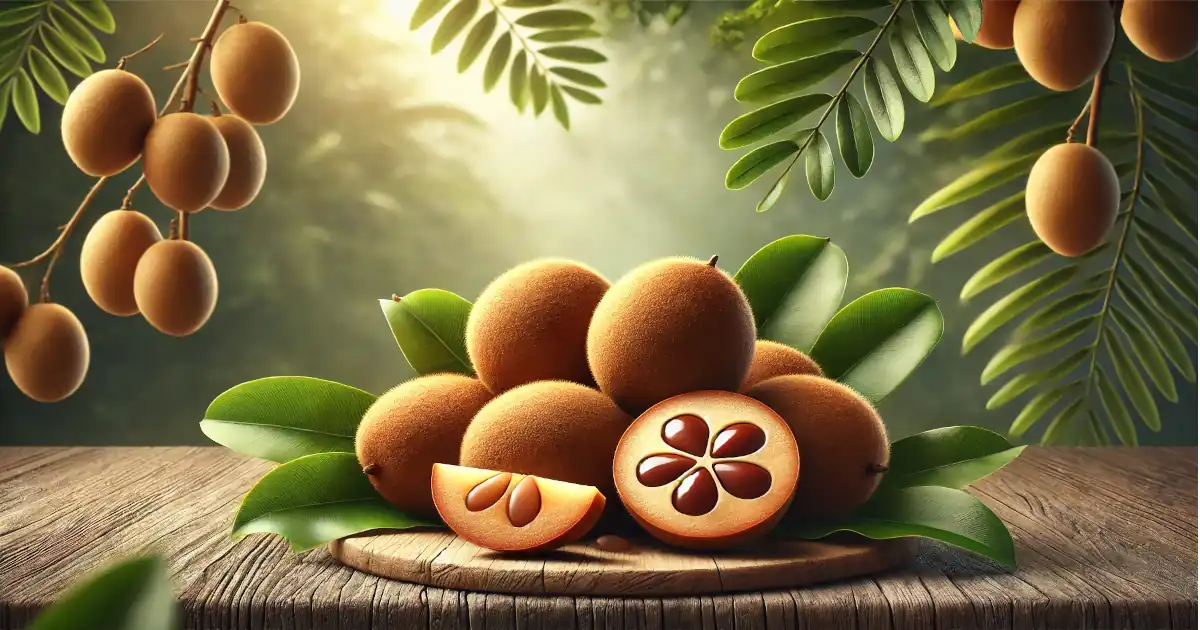Chikoo: A Tropical Superfruit with Surprising Health Benefits
Chikoo, also known as sapodilla, is a tropical fruit that has captured the hearts of people around the world with its sweet, malty flavor and numerous health benefits. Native to the rainforests of Central America, this small, brown, unassuming fruit packs a punch when it comes to nutrition and flavor. Despite its growing popularity, many are still unfamiliar with its benefits, origins, and various uses.
In this article, we will dive deep into everything you need to know about : from its origins and cultivation to its nutritional value, health benefits, culinary uses, and much more. This guide will help you appreciate why deserves a place in your diet.
1. Introduction to Chikoo
Chikoo, or sapodilla, is a delicious tropical fruit primarily found in South Asia, Mexico, and Central America. This sweet and pulpy fruit is revered for its caramel-like taste and soft, grainy texture. It is a beloved ingredient in juices, smoothies, and desserts due to its rich flavor and high sugar content.
Known for its high levels of vitamins, minerals, and fiber, is considered a superfruit by many nutritionists and health enthusiasts. It is also an excellent source of antioxidants, making it a valuable addition to a balanced diet.
2. Origins and Cultivation
The sapodilla tree (Manilkara zapota), from which comes, is native to Central America, particularly southern Mexico and Belize. The tree thrives in tropical climates, and it was originally cultivated for its latex, known as chicle, which was used in making chewing gum.
Today, is grown extensively in India, Thailand, Sri Lanka, and the Philippines. It is also cultivated in parts of Africa and the Caribbean. The tree is an evergreen, hardy plant that can survive in dry conditions and poor soils, making it a sustainable crop in many regions.
The fruit grows in clusters and takes six to eight months to mature. When ripe, the fruit is round to oval, with a rough, brown skin. The pulp inside is soft and sweet, with a flavor often described as a blend of brown sugar, pear, and honey. Each fruit contains two to five shiny black seeds, which should be removed before consumption.
3. Nutritional Profile
Chikoo is a nutrient-dense fruit that offers a variety of essential vitamins, minerals, and fiber. Here’s a breakdown of its key nutritional components:
- Calories: is a calorie-rich fruit, with approximately 83 calories per 100 grams. Most of these calories come from carbohydrates, making it an excellent energy source.
- Carbohydrates: A 100-gram serving of contains about 19.9 grams of carbohydrates, including natural sugars like fructose and sucrose.
- Fiber: is packed with dietary fiber, with about 5.3 grams per 100 grams of fruit. This high fiber content is essential for digestive health.
- Vitamins: is an excellent source of vitamin C, providing about 24 mg per 100 grams, which is around 40% of the daily recommended intake. It also contains small amounts of vitamins A, E, and K.
- Minerals: rich in essential minerals like potassium, iron, calcium, magnesium, and phosphorus, all of which contribute to overall well-being.
- Antioxidants: The fruit contains polyphenolic compounds, which act as antioxidants and protect the body against free radicals.

4. Health Benefits of Chikoo
Chikoo as an Immunity Booster
Chikoo is rich in vitamin C, which plays a vital role in boosting the immune system. Regular consumption of this fruit can help the body fight off infections, protect against colds and flu, and enhance overall immune function. The antioxidants in also support the immune system by reducing oxidative stress and inflammation.
Chikoo for Digestive Health
One of the standout benefits of is its high fiber content. The fiber helps to promote healthy digestion by preventing constipation and ensuring smooth bowel movements. Additionally, contains tannins, which have anti-inflammatory and antibacterial properties that can help soothe digestive tract irritations and combat infections.
Chikoo for Healthy Skin
Chikoo is packed with antioxidants, including vitamins A and C, which play a crucial role in maintaining healthy skin. These antioxidants help fight free radicals, slow down the aging process, and reduce the appearance of wrinkles, fine lines, and age spots. Regular consumption of can give your skin a healthy glow, while topical applications using -based masks or scrubs can rejuvenate tired skin.
Chikoo’s Role in Bone Health
Chikoo is a good source of calcium, phosphorus, and iron, all of which are essential for maintaining strong and healthy bones. Calcium and phosphorus are key to bone formation, while iron is crucial for preventing anemia and maintaining healthy red blood cells. Including in your diet can support bone health, especially in older adults and growing children.
5. Culinary Uses of Chikoo
Chikoo’s sweet and malty flavor makes it a versatile ingredient in the kitchen. It can be eaten fresh or used in a variety of dishes, from beverages to desserts. Some popular culinary uses of include:
- Chikoo Smoothies: Blended with milk, yogurt, or other fruits like bananas or mangoes, makes for a delicious and nutritious smoothie.
- Chikoo Ice Cream: The creamy texture of lends itself well to ice creams and sorbets.
- Chikoo Milkshake: A refreshing milkshake is a popular treat in many tropical countries. It’s made by blending chikoo pulp with cold milk and a touch of sugar.
- Chikoo Jam or Chutney: can be cooked down into a sweet jam or chutney, which pairs well with bread, crackers, or as an accompaniment to savory dishes.
- Chikoo Pudding: This fruit can be used in making creamy, flavorful puddings or custards, offering a healthy twist to traditional desserts.
6. Chikoo in Traditional Medicine
In traditional medicine, particularly Ayurveda, is highly regarded for its medicinal properties. Its uses include:
- Anti-inflammatory Agent: tannins have been used to treat inflammation and pain, particularly in conditions like gastritis and irritable bowel syndrome (IBS).
- Anti-diarrheal: The fruit is known for its ability to combat diarrhea due to its astringent properties.
- Expectorant: is often used as a remedy for coughs and colds, as it helps to expel mucus from the respiratory tract.
7. Chikoo Farming: A Sustainable Option
Chikoo farming is considered sustainable because the sapodilla tree is highly adaptable to various climates and soil types. It requires minimal water and can thrive in dry, arid regions where other crops might struggle. The tree is also hardy and resistant to pests and diseases, reducing the need for chemical pesticides and fertilizers. As a result, farming has a low environmental impact, making it an eco-friendly choice for fruit cultivation.
8. How to Select and Store Chikoo
When buying , look for fruits that are slightly soft to the touch but not mushy. Ripe should have a smooth, brown skin and a pleasant aroma. Avoid fruits with wrinkles, cracks, or bruises, as these are signs of overripeness or damage.
Chikoo can be stored at room temperature until ripe. Once ripe, it’s best to store the fruit in the refrigerator to prolong its shelf life. If you have an abundance of , you can also freeze the pulp for later use in smoothies or desserts.
9. Chikoo Recipes You Can Try at Home
Chikoo Smoothie Recipe
- Ingredients:
- 2 ripe fruits (peeled and seeds removed)
- 1 banana
- 1 cup of milk or plant-based milk
- 1 teaspoon honey or maple syrup
- A few ice cubes
- Instructions:
- Blend all ingredients together until smooth.
- Serve chilled and enjoy!
Chikoo Pudding Recipe
- Ingredients:
- 4 ripefruits (peeled and seeds removed)
- 1 cup of coconut milk
- 2 tablespoons chia seeds
- 1 teaspoon vanilla extract
- Honey to taste
- Instructions:
- Blend and coconut milk until smooth.
- Mix in chia seeds, vanilla, and honey.
- Let it sit for 2 hours in the fridge to thicken.
- Enjoy a healthy and delicious dessert!
10. Conclusion: Why Chikoo Should Be in Your Diet
Chikoo is much more than a sweet tropical treat. It is a nutritional powerhouse packed with essential vitamins, minerals, and antioxidants. From boosting immunity and aiding digestion to supporting bone health and keeping your skin youthful,offers a wide range of health benefits.
Whether eaten fresh or used in a variety of recipes, can add a delicious and nutritious touch to your diet. With its sustainability as a crop, is also an environmentally friendly option for fruit lovers. So, next time you’re looking for a healthy snack or a unique ingredient for your meals, give a try!
Frequently Asked Questions (FAQs)
What are the health benefits of eating chikoo regularly?
Chikoo is rich in vitamins, minerals, and antioxidants, offering numerous health benefits. Regular consumption can improve digestion due to its high fiber content, support immune function with its vitamin C, and promote healthy skin thanks to its antioxidants. It also aids in bone health and helps maintain energy levels.
Is chikoo good for weight loss?
Although is naturally sweet and contains calories, it is also packed with dietary fiber, which helps you feel full for longer. Consuming in moderation as part of a balanced diet can assist in maintaining healthy digestion and managing weight.
Can chikoo be eaten during pregnancy?
Yes, is safe to consume during pregnancy. Its rich vitamin and mineral content, particularly calcium, iron, and folate, can be beneficial for both the mother and the baby. However, as with any fruit, it’s best to consume it in moderation.
How do I know when chikoo is ripe and ready to eat?
A ripe will feel slightly soft to the touch, similar to a ripe avocado. The skin will turn smooth and brown, and the fruit will emit a mild, sweet aroma. Avoid fruits that are too hard or overly mushy, as they are either unripe or overripe.
Can chikoo be included in a diabetic-friendly diet?
Contains natural sugars, so people with diabetes should eat it in moderation. While its fiber content helps regulate blood sugar levels, it’s advisable for those with diabetes to consult a healthcare provider before adding it to their diet.
What are some popular dishes made using chikoo?
Chikoo is a versatile fruit that can be used in many dishes. Popular options include chikoo smoothies, milkshakes, ice creams, and even jams or chutneys. It can also be incorporated into baked goods or eaten fresh as a healthy snack.
READ ALSO: What Personality Type is Best for Success in Life?
 Touch Blog
Touch Blog



